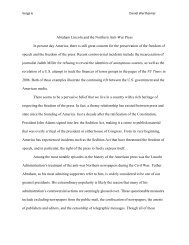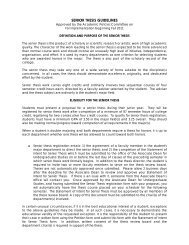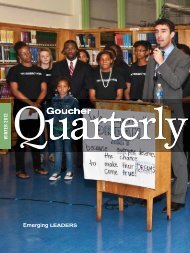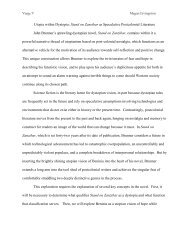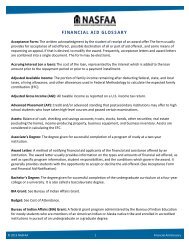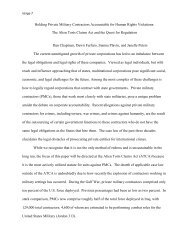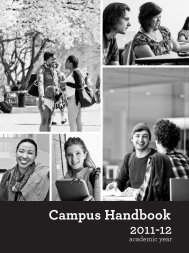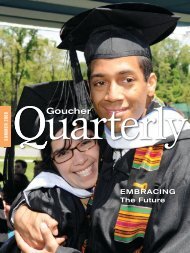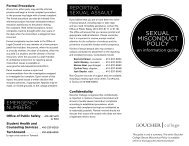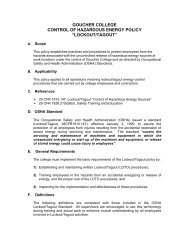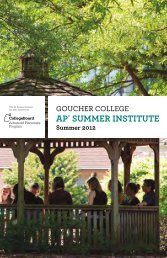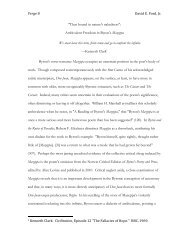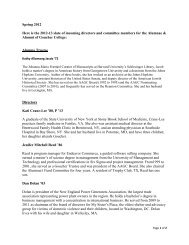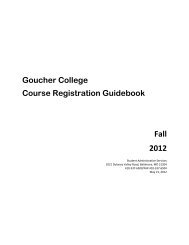Goucher College Registration Guidebook Spring 2013
Goucher College Registration Guidebook Spring 2013
Goucher College Registration Guidebook Spring 2013
You also want an ePaper? Increase the reach of your titles
YUMPU automatically turns print PDFs into web optimized ePapers that Google loves.
<strong>Goucher</strong> <strong>College</strong><br />
<strong>Registration</strong> <strong>Guidebook</strong><br />
<strong>Spring</strong><br />
<strong>2013</strong><br />
Student Administrative Services<br />
1021 Dulaney Valley Road, Baltimore, MD 21204<br />
410‐337‐6500/FAX 410‐337‐6504<br />
October 19, 2012
***IMPORTANT***<br />
The course schedule is available to you online.<br />
View the schedule on my<strong>Goucher</strong> at<br />
https://olympus.goucher.edu/SelfService/Search/SectionSearch.aspx<br />
My<strong>Goucher</strong> directly reflects the current course schedule and course enrollments.<br />
For additional information about Records and <strong>Registration</strong> please visit our web site at:<br />
http://www.goucher.edu/x1875.xml<br />
<strong>Goucher</strong> <strong>College</strong> reserves the right to change or cancel without notice programs of study,<br />
requirements, course offerings, policies, regulations, procedures, calendar, financial aid, fees, or other<br />
matters. Revision and additions to the class schedule are published at the beginning of each semester<br />
and are updated in a timely manner. Failure to read this booklet does not constitute a reason for<br />
noncompliance with the stated college policy. It is the responsibility of the student to keep apprised of<br />
all changes. The <strong>Goucher</strong> <strong>College</strong> Class Schedule Booklet is not to be regarded as a contract.<br />
It is the responsibility of each student to monitor his or her academic progress at <strong>Goucher</strong> <strong>College</strong>. The<br />
student is expected to know the graduation requirements pertinent to his or her program, to be<br />
cognizant of his or her grade point average, to make appropriate elective course selections, and to<br />
add/drop courses to best facilitate attainment of his or her educational goals. To assist in making<br />
these important decisions, the <strong>College</strong> provides each student with an Academic Advisor.<br />
2
<strong>Registration</strong> Information<br />
UNDERGRADUATE REGISTRATION – <strong>Spring</strong> <strong>2013</strong><br />
Dates for spring <strong>2013</strong> <strong>Registration</strong><br />
Academic advising begins for spring <strong>2013</strong> Monday, October 29<br />
<strong>Registration</strong> begins for spring <strong>2013</strong> Monday, November 12<br />
STEP 1: ACADEMIC ADVISING<br />
Advising for students is October 29 to November 9. Schedule an appointment with your adviser early.<br />
Advising sessions generally take a half hour, sometimes longer.<br />
Use the Academic Catalog (to note required courses) and the spring class schedule to start your planning<br />
process. The schedule will be posted on the web October 19. Bring to the advising session a completed<br />
course change form as a first draft of the courses you want/need to take. Many advisors require that<br />
advisees take this first step before starting an advising session.<br />
After the advising session (which must be in‐person, not via email, unless you are away from <strong>Goucher</strong> this<br />
semester) your adviser will release you for registration. If you need to add courses requiring signatures<br />
other than your advisers, a course change form should be signed by your adviser during the advising<br />
session. (The course change form is available at http://www.goucher.edu/x1893.xml)<br />
Select alternate courses during your advising session, in case your first choices are full.<br />
Prerequisites: You may only register for courses for which you have met the required prerequisites unless<br />
the instructor has signed a course change form to waive them.<br />
ICA’s require acceptance into the program to register. ICA registration will be done by the Registrar’s<br />
Office in SAS. Make sure you calculate the ICA credits into the total you are allowed when registering<br />
online.<br />
Instructors’ signatures are required for audits, closed courses, time overlaps and any course in which you<br />
are required to have the permission of the instructor to enroll. Instructor and department chair<br />
signatures are required for independent work. <strong>Registration</strong> for any of the above course types must be<br />
done in‐person in the Registrar’s Office (Mon‐Fri, 8:45 a.m.‐5 p.m.) after your assigned day and time for<br />
registration. A completed course change form must be submitted. Printed, attached emails will be<br />
accepted as signatures.<br />
When registering on‐line, pass/no pass can only be selected for courses required to be graded as such (PE<br />
activity etc.). Changing from a regular grade to pass/no pass can be done by completing a course change<br />
form and bringing it to SAS after your assigned registration time. See pass/no pass in the catalog at:<br />
http://www.goucher.edu/x1388.xmll (p. 55).<br />
<strong>Registration</strong> for internships requires the Internship Learning Agreement (ILA) be submitted to the Career<br />
Development Office for approval. (Be sure to check deadlines.) After approval by the CDO, the ILA is<br />
submitted to the Registrar’s Office for entry.<br />
<strong>Registration</strong> for senior thesis requires the Senior Thesis Guidelines and Form be submitted to the<br />
Associate Dean’s office for approval. (Be sure to check deadlines.) After approval by the Associate Dean’s<br />
office, the Senior Thesis <strong>Registration</strong> Form is submitted to the Registrar’s Office for entry.<br />
STEP 2: RESOLVE HOLDS<br />
Contact the appropriate office to resolve any stop flag (hold) placed on your account before your assigned<br />
registration start day and time, such as those noted by Billing, the Registrar’s Office, the Health Center,<br />
1
Financial Aid, the Associate Dean’s Office, etc. <strong>Registration</strong> cannot occur unless the stop flag (hold) is<br />
removed. Your holds appear when you log on to my<strong>Goucher</strong>.<br />
STEP 3: REGISTRATION<br />
The deadline to initially register for <strong>Spring</strong> <strong>2013</strong> is Thursday, December 13. After this date, students will<br />
be charged a $100 fee late registration fee.<br />
The order of registration has been determined by the students’ number of completed credits. Students<br />
will be able to see their assigned registration start time on their my<strong>Goucher</strong> account on Monday, October<br />
22. Online registration groups will start in 30 minute intervals and can continue to make schedule changes<br />
from the assigned time through Monday, January 28 at midnight. Beginning January 29, students who<br />
have not registered or students who need to make schedule changes must do so in person in the Office of<br />
the Registrar.<br />
Through January 28, students will be able to make schedule changes online only if initial approval for<br />
registration was received from the adviser (approval is needed one time only). Your adviser will receive<br />
an e‐mail showing changes that are made each day they are processed. Closed courses, time overlaps,<br />
credit overloads, audits, independent work, and special permission courses will need to be registered for<br />
in person, as they require a manual override. Once a manual override is required for any reason, a manual<br />
override will be required for any subsequent schedule change, and these will have to be made in person<br />
in SAS.<br />
Course credit load is determined by your GPA and credits completed (catalog p.51). See course load in<br />
the catalogue at: http://www.goucher.edu/x1388.xml<br />
To register for credit overloads, an approved petition along with a course change form and all required<br />
approvals must be submitted to the Associate Dean for Undergraduate Studies. If approved, the petition<br />
and registration materials will be sent to the Office of the Registrar for entry. Students will be additionally<br />
charged the part‐time tuition rate for all credits over the limit of 18 credits per semester.<br />
If you encounter technical problems, please send an e‐mail message to the helpdesk@goucher.edu. The<br />
helpdesk e‐mail will be monitored for problems during registration.<br />
Credits completed as of Oct 19, 2012<br />
Your registration begins:<br />
87 or more credits completed Monday, November 12 (7:00 p.m.‐9:00 p.m. assigned<br />
start times). <strong>Registration</strong> and schedule changes<br />
continue online until Monday, January 28 at midnight.<br />
57‐86.99 credits completed Tuesday, November 13 (7:00 to 9:00 p.m. assigned<br />
start times). <strong>Registration</strong> and schedule changes<br />
continue on‐line until Monday, January 28 at midnight.<br />
27‐56.99 credits completed Wednesday November 14 (7:00 to 9:00 p.m. assigned<br />
start times). <strong>Registration</strong> and schedule changes<br />
continue on‐line until Monday, January 28 at midnight.<br />
0‐26.99 credits completed Thursday, November 15 (7:00 to 10:00 p.m. assigned<br />
start times). <strong>Registration</strong> and schedule changes<br />
continue on‐line until Monday, January 28 at<br />
midnight.<br />
All classes and<br />
Non‐Candidates<br />
Friday, November 16 (8:00 a.m.) <strong>Registration</strong> and<br />
schedule changes continue on‐line until Monday,<br />
January 28 at midnight.<br />
2
Important Information<br />
ADD/DROP PERIOD for spring semester will posted on Important Academic Dates at<br />
http://www.goucher.edu/x1393.xml. Any drops after this period will result in a “W” on the academic<br />
record. Students should always retain a copy of the course change form for their records.<br />
ADVISOR – The Associate Dean for Undergraduate Studies assigns and processes all changes of advisors.<br />
Students must consult with their advisors before making course selections. Course change forms must be<br />
signed by advisors prior to submission to SAS.<br />
AUDITING ‐ Election of the audit must be done at the point of registration for the course or within the<br />
deadline for adding courses. Auditing requires the signatures of the instructor and the advisor. Students<br />
may withdraw from an audit through the last day of classes. <strong>College</strong> policy prohibits changing an audit to<br />
credit or vice versa, after the add/drop deadline.<br />
BALTIMORE STUDENT EXCHANGE PROGRAM ENROLLMENTS – Schedules from BSEP colleges are available<br />
on the web. BSEP registration forms should be submitted to the SAS office with the appropriate<br />
signatures. Participating institutions process the BSEP forms at the end of their students' registration<br />
period. <strong>Goucher</strong> students are notified of acceptance as it occurs. Seniors expecting to graduate in May,<br />
and enrolling in a BSEP course in the spring, must have prior approval from the host college indicating that<br />
the final grade for the course will be submitted to the SAS office at <strong>Goucher</strong> by the published date. BSEP<br />
courses may only be taken in the fall or spring semester (not summer or winter semesters). Ordinarily<br />
only 2 courses may be taken per year. Courses must be taken for regular grade.<br />
INTERNSHIPS (OR OFF‐CAMPUS INDEPENDENT WORK) require separate forms, which are available in the<br />
Career Development Office. These courses will be added to students’ schedules upon receipt of the<br />
completed, approved forms from the CDO.<br />
LOCATION OF CLASSES – All classes meet at <strong>Goucher</strong> <strong>College</strong> unless otherwise indicated on my<strong>Goucher</strong>.<br />
MAJOR – Forms and instructions for declaring or changing majors are available in the Office of the<br />
Associate Dean for Undergraduate Studies. All students must declare a major before registering for the<br />
first semester of their junior year. The completed forms are submitted to the Office of the Associate Dean<br />
for Undergraduate Studies.<br />
NON‐GOUCHER COURSES – Students may take pre‐approved courses at other institutions during the<br />
summer or winter by submitting the Non‐<strong>Goucher</strong> Course Approval Form to SAS. Only 15 hours in total,<br />
of non‐<strong>Goucher</strong> summer and winter work with a grade of C‐ or better are applicable to the degree.<br />
PASS/NO PASS – Pass is defined as A through C‐. The course will appear on the transcript, but the GPA<br />
will not be affected. Students receiving a grade of No Pass will not receive credit for the course. Students<br />
may elect to take two courses per academic year on a pass/no pass basis. This option is done on a course<br />
change form and can be changed until the pass/no pass deadline at week 10. Courses only offered<br />
pass/no pass are not included in the pass/no pass course limit. Honors courses cannot be taken pass/no<br />
pass. Students cannot elect courses in the major as pass/no pass unless the courses are graded only on a<br />
pass/no pass basis.<br />
REPEATED COURSES – Students may repeat any courses for which they received less than a C‐ grade.<br />
Both the original grade and the grade for the repeated course are included in the GPA, but the credits are<br />
counted only once. If a student repeats a course for which a passing grade of below C‐ was received the<br />
first time, the student will receive a grade of RA, RB, RC… the second time the course is taken.<br />
Departments decide if students must repeat courses in the major if the grades are below C‐, or if they will<br />
permit the students to substitute other courses for the major. Approval must be obtained from the<br />
appropriate department chair if a student wishes to repeat a course over this limit. If a student repeats a<br />
course for which a grade of C‐ or above was received the first time, the student will receive a grade of XA,<br />
XB, XC… the second time the course is taken. A student will not receive credit a second time, and X<br />
grades are not calculated into the GPA. The policy does not include courses which may be repeated for<br />
credit as listed in the catalogue.<br />
3
SEVEN‐WEEK COURSES – Subsession 01 indicates that the course meets for the entire semester. 02<br />
indicates that the course meets for the first seven weeks. 03 indicates that the course meets for the<br />
second seven weeks. Students should register for 7 week courses during registration. There is a special<br />
add/drop period for these classes.<br />
SENIOR THESIS – In order to register for a Senior Thesis, students must complete a Senior Thesis Form and<br />
obtain signatures from the faculty advisor selected by the student, the department chair, and advisor.<br />
The Senior Thesis form must be filed with the Associate Dean for Undergraduate Studies.<br />
4
General Education Requirements<br />
For ALL students who started attending <strong>Goucher</strong> <strong>College</strong> prior to Fall 2011. Students<br />
beginning at <strong>Goucher</strong> <strong>College</strong> in Fall 2011 or later should go by the Liberal Education<br />
Requirements. View General Education Requirements at:<br />
http://catalog.goucher.edu/content.php?catoid=3&navoid=620#General_Education_Re<br />
quirements<br />
Liberal Education Requirements (LERs)<br />
For ALL students beginning at <strong>Goucher</strong> <strong>College</strong> in Fall 2011 or later. Previously<br />
attending returning students should go by the General Education Requirements listed<br />
previously. View Liberal Education Requirements at:<br />
http://catalog.goucher.edu/content.php?catoid=3&navoid=620#Liberal_Education_Req<br />
uirements__LER)<br />
Lists of courses offered in <strong>Spring</strong> <strong>2013</strong> that satisfy general education and liberal<br />
education requirements will be posted at:<br />
http://www.goucher.edu/x1980.xml<br />
5
Writing Across the Curriculum (WAC)<br />
Writing across the curriculum courses are intended primarily for college writing proficiency, unless they<br />
also have been specifically designated as a writing proficiency in the major requirement by a department<br />
(see writing proficiency in the major). Students must sign a contract with the course instructor in order to<br />
take a course for <strong>College</strong> Writing Proficiency. Writing across the curriculum courses include:<br />
COG/PHL 275<br />
Epistemology<br />
DAN 250<br />
DAN 251<br />
DAN 255<br />
Twentieth Century Dance and Its Relation to Other<br />
Modern Art<br />
Great Choreographers and Dancers<br />
American Dance Tradition<br />
* ENG 219 Linguistics<br />
ENG/WS 222<br />
ENG 230<br />
ENG 240<br />
ENG 243<br />
ENG 260<br />
ENG 264<br />
ENG 276<br />
ENG 277<br />
ENG 285<br />
Women and Literature<br />
The Classical Tradition<br />
Medieval Literature<br />
Renaissance Literature<br />
The Early English Novel<br />
The Later English Novel<br />
Modern Poetry<br />
Contemporary American Poets<br />
Between Two Worlds<br />
* ENG 330 Special Topics in English Literature to 1700<br />
HIS 238<br />
Comparative History of Colonialism in Asia<br />
* MUS 313 Computer Music Seminar<br />
PHL 220<br />
PHL/RLG 226<br />
PHL/RLG 235<br />
PHL 260<br />
PSC 201<br />
Phenomenology<br />
Medieval & Renaissance Philosophy<br />
Hermeneutics & Deconstruction<br />
Ancient Philosophy<br />
Modern Political Thought<br />
* PSC 224 European Politics Today<br />
PSC 225<br />
PSC 227<br />
RLG 228<br />
SOC 217<br />
British Politics<br />
The Politics of Germany<br />
Philosophy of Religion<br />
Methods of Social Research<br />
6
THE 200<br />
WS/ENG 222<br />
WS 224<br />
Twentieth Century Theatre<br />
Women and Literature<br />
Gender, Identity, and Race in Caribbean Culture<br />
* WS 227 Becoming Visible: Fictions International Female<br />
WS 240<br />
WS 250<br />
WS /PHL 276<br />
Women, War, and Peace<br />
Selected Topics in Women's Studies<br />
Feminist Philosophy<br />
*asterisked courses are offered as WAC in spring <strong>2013</strong><br />
7
Writing Proficiency in the Major<br />
American Studies<br />
Consult department chair.<br />
Anthropology SOC 210<br />
Art<br />
Complete at least two 200 or 300‐level courses in Art History<br />
with a grade of C or better<br />
Biological Sciences BIO 214 BIO 240<br />
BIO 224 BIO 260<br />
Chemistry CHE 265L CHE 346<br />
CHE 266L CHE 356<br />
CHE 342 CHE 373<br />
Comunication & Media Studies<br />
COM 262‐ with a grade of B‐ or higher<br />
(Complete before second semester junior year)<br />
Computer Science CS 245 ENG 206<br />
CS Senior Thesis MA 260<br />
Dance<br />
Dan 390 – with a grade of B‐ or better<br />
Economics<br />
ENG 206 with a grade of C‐ or better<br />
Education ED 210 ENG 226<br />
ED 222 SPE 320<br />
English ENG 200<br />
French<br />
Any 300 level course in the major<br />
Historic Preservation HP 320/ART 347<br />
History HIS 338 HIS 387<br />
Individualized Interdisciplinary Major<br />
Consult IDS Chair.<br />
International Relations PSC 200 PSC 263<br />
PSC 224 PSC 257<br />
PSC 264 PSC 258/JS 258<br />
Any 200 or 300 level course with permission of instructor<br />
Management ENG 206<br />
Mathematics CS 245 MA 260<br />
ENG 206 MA Senior Thesis<br />
Music MUS 260 MUS 349<br />
Peace PCE 205<br />
Philosophy<br />
Consult department chair<br />
Physics ENG 206<br />
Political Science PSC 200 PSC 202<br />
PSC 258 PSC 207<br />
PSC 263 PCS 224<br />
PSC 264 PSC 225<br />
PSC 282 PSC 227<br />
Any 200 or 300 level course with permission of<br />
Instructor<br />
Psychology PSY 252 PSY 255<br />
Religion<br />
Consult department chair.<br />
Russian<br />
Any 300‐level course in the major.<br />
Sociology SOC 210<br />
Spanish<br />
Any 300‐level course in the major<br />
Special Education ED 210 ED 222<br />
SPE 320 SPE 324<br />
SPE 326 SPE 328<br />
Theatre THE 390/391<br />
Women’s Studies WS 224 WS 300<br />
WS 227 WS 320<br />
8
Descriptions for New and Special Topics Courses<br />
<strong>Spring</strong> <strong>2013</strong><br />
AFRICANA STUDIES<br />
AFR/HIS 205.001: Bad Spirits: The Atlantic Slave Trade in History and Memory (3 credits)<br />
Between 1500 and 1866, an estimated 12.5 million Africans were forcibly removed from their families<br />
and loved ones and shipped across the Atlantic Ocean to labor as slaves in the Americas. The vast scope<br />
of the slave trade – in terms of its human toll as well as its reach across the continents – left an indelible<br />
stamp on societies on both sides of the Atlantic. This course examines the slave trade and its lasting<br />
imprint on the modern psyche through three different lenses: through the experience of the slaves,<br />
slave traders, and other Atlantic contemporaries who lived through its growth and abolition; through<br />
the interpretations of historians who have studied the trade; and through the creative work of Atlantic<br />
“ancestors” – such as spiritual diviners, filmmakers, and writers – who have wrestled with its legacies<br />
and meanings in more recent history. By looking at the slave trade through these different perspectives,<br />
this course not only aims to introduce participants to some of the core themes in the history of the slave<br />
trade, but also to provide students with insight into the trades’ cultural impacts past and present.<br />
Prerequisite: Sophomore standing or permission of the instructor. Recommended: HIS 110, 116, 117 or<br />
AFR 200.<br />
AFR/HIS 207.001: Comparative History of Sub‐Saharan Africa (3 credits)<br />
This course offers a comparative examination of several of the diverse histories, cultures, and societies<br />
that have contributed to making of the African continent. Divided into five parts, the course begins with<br />
a broad overview of precolonial state formation in both “medieval” Africa and the era of the Atlantic<br />
slave trade, continue with an analysis of the transition to “legitimate” commerce and the onset of<br />
colonialism, and conclude with a discussion about anti‐colonial struggles and the rise of new postcolonial<br />
nation‐states in the 20 th century. After establishing this broad outline, the course will proceed<br />
by exploring three to four African countries in closer detail in an effort to draw out comparisons across<br />
linguistic, cultural, and national boundaries. Specific attention will be given to the social dimensions of<br />
changing relationships across ethnic, gender, and religious lines, strategies of dominance and resistance<br />
in the colonial era, and the intellectual and expressive contours of the post‐colonial conundrum.<br />
Prerequisite: Sophomore standing or permission of the instructor. Recommended: HIS 117 or AFR 200.<br />
ART<br />
ART 382.001 Cabinet of Wonders: Nature and Art Before the Age of Science: The seminar explores the<br />
Cabinet of Wonders as an important cultural phenomenon during the Early Modern Period (1500‐1800).<br />
The assemblages in these cabinets take as their principal theme the rivalry between nature and art in<br />
the creation of objects that generate excitement and wonder.<br />
Prerequisite: One 200 level art history course, junior standing or permission of the instructor.<br />
CHEMISTRY<br />
CHE 240.001 Biophysical Chemistry (3 credits)<br />
Exploration of the states of matter and laws of thermodynamics applied to chemical systems and rates<br />
of reactions. Emphasis will be placed on the physical chemistry of biological systems and the theoretical<br />
basis for various biophysical techniques.<br />
Prerequisites of MA180 and PHY115 or 125, Bio 210, CHE151 and CHE152 (or 152H).<br />
CHE 391H: Light and Life (3 credits)<br />
9
A seminar course offered to extend knowledge in the applications of the light to both chemical systems<br />
and daily life in the 21st century. Material will focus on topics such as medical imaging, light in the<br />
environment and biological systems, energy technology, data storage and retrieval, communications<br />
technology, and laser spectroscopy, as well as other areas of particular student interest. Students will be<br />
expected to complete assigned readings from the current literature, problem sets, and oral<br />
presentations. Prerequisite: CHE 235.<br />
COMUNICATIONS<br />
COM/ES 205.001: Debunked! Environmental Writing & Communication. (3 credits)<br />
This 200‐level environmental communication and writing class will focus on improving scientific literacy<br />
across a variety of media. We will prepare students to be intelligent consumers of popular<br />
environmental discourse, able to distinguish valid science‐based information from disinformation. As<br />
well, the course will stress competent science‐based environmental writing. Students will be expected<br />
to understand science‐based articles in newspapers, magazines, and journals; and scientifically‐themed<br />
television programming. Assignments will include a letter to the editor, a storyboard for a television<br />
episode, a corporate press release, an NGO white paper, and an in‐depth research article. The course<br />
will focus on environmental and sustainability‐based subjects.<br />
Prerequisite: <strong>College</strong> writing proficiency requirement.<br />
.<br />
COM 272PP.1BA: Intensive Course Abroad: Alternative Media and Culture in the Balkans – pre‐course (2<br />
credits) This course provides an international field experience in the arts, culture, and social activism in<br />
the recently‐independent nations of the former Yugoslavia. The program will be centered in Bosnia, and<br />
the cultural projects that have challenged political, social, and aesthetic conventions. Students will meet<br />
internet activists, filmmakers, event organizers, and others exploring innovative approaches to media.<br />
The course will explore the dynamics of alternative media and cultural production. Students enrolled in<br />
COM 272PP will complete the spring pre‐course, the summer trip and the fall post‐course for a total of 7<br />
credits<br />
COM 272PR.1BA: Intensive Course Abroad: Alternative Media and Culture in the Balkans – pre‐course (2<br />
credits) This course provides an international field experience in the arts, culture, and social activism in<br />
the recently‐independent nations of the former Yugoslavia. The program will be centered in Bosnia, and<br />
the cultural projects that have challenged political, social, and aesthetic conventions. Students will meet<br />
internet activists, filmmakers, event organizers, and others exploring innovative approaches to media.<br />
The course will explore the dynamics of alternative media and cultural production. Students enrolled in<br />
COM 272PR will complete the spring pre‐course, and the summer trip, but no fall post‐course.<br />
COM 301.001:Alternative Media (3 credits)<br />
This course will address the production and distribution of alternative forms of media in video, film,<br />
print, music and digital culture, from guerilla video groups using low-tech means to make<br />
documentaries to community radio stations. The course will explore innovations in aesthetics,<br />
production structures, and distribution methods and the ability of such work to represent groups<br />
and viewpoints which have been denied regular access to mainstream media.<br />
Prerequisite: at least two of the 200 level required theory/criticism and history courses,<br />
departmental and college writing proficiency, and junior or senior status; or permission of the<br />
instructor.<br />
COM 307.001 History of African‐American Film (4 credits)<br />
10
This survey course will examine the history and theory of African American filmmaking from the silent<br />
era to the present. This course will explore the political and aesthetic debates central to African<br />
American film by focusing on different genres and filmmakers. Independent and commercial films will<br />
be included with a focus on black directors, writers and producers. Students will consider the ways<br />
specific films and genres construct race, identity, and community (family) and the role that class, gender<br />
and sexuality play in this construction. Students will consider issues of access and ownership in the<br />
development of a black aesthetic in film. Issues of representation and authorship will be examined in<br />
addition to exploring the links between African American cinema and cinemas of the African Diaspora.<br />
Prerequisite: Writing proficiency in the major and the permission of the instructor.<br />
COM 307.001: Special Topics World Cinema: Film Noir (4 credits)<br />
Classical film noir was a highly stylized film cycle characterized by cynical, black‐and‐white movies of the<br />
1940s and 1950s‐‐often melodramas about private eyes, femme fatales, criminal gangs, and lovers on<br />
the run. Grounded in existentialism, these shadowy films characteristically followed the doomed lives<br />
and relationships of their disillusioned characters in a post‐war world of anxiety. As such, the films<br />
revealed the dark side of American life. Following the classical period, more contemporary "neo‐noirs"<br />
continue to explore the underbelly of the American dream. This course analyses this unique film style<br />
from its inception in the 1940s up to the present.<br />
Prerequisite: COM 239 and/or COM 245, departmental and college writing proficiency, and junior or<br />
senior status; or permission of the instructor<br />
COM 312.003: Issues in Broadcasting and the Electronic Media: Writing and Producing for the Web (3)<br />
This course is intended to provide students with the skills to use digital and social media to<br />
communicate effectively. Along with learning those hands‐on skills, students will also be provided with a<br />
theoretical grounding in the social responsibilities connected with using those skills in a way that helps<br />
provide citizens with reliable, verified and trustworthy information. In line with that goal, there will be a<br />
strong focus early in the course on media ethics and the role of new media in democratic societies. This<br />
will include issues of privacy, free speech and libel. There will be emphasis on the standards and<br />
practices of responsible and professional communication.<br />
Prerequisite: completion of two of the 200‐level required theory/criticism and history courses,<br />
departmental and college writing proficiency, and junior or senior status; or permission of the<br />
instructor.<br />
COM/WS 325.001: Women and Film (4 credits)<br />
This course will examine the relationship between women and the film industry, from the days of silent<br />
film to the 21st century. We will look at the roles women have played, both in front of and behind the<br />
camera‐from the female star of the classical Hollywood "woman's" film of the 1930's‐1940's, and the<br />
iconic stereotypes that have pervaded Hollywood gendered discourse, to the re‐emergent role of<br />
women as directors, screenwriters, and producers in contemporary Hollywood and world cinemas.<br />
Interrogating the role of women as icons, producers, and consumers, we will try to understand where<br />
we came from and how we got to the here and now. Hollywood, independent, and international film will<br />
be examined.<br />
Prerequisites: COM 239 and/or 245, or WS 230; departmental and college writing proficiency; junior or<br />
senior status; or permission of the instructor.<br />
ECONOMICS<br />
EC 325.001: Economics of Global Food Production (new course)<br />
11
ENVIRONMENTAL SCIENCE<br />
ES/COM 205.001: Debunked! Environmental Writing & Communication. (3 credits)<br />
This 200‐level environmental communication and writing class will focus on improving scientific literacy<br />
across a variety of media. We will prepare students to be intelligent consumers of popular<br />
environmental discourse, able to distinguish valid science‐based information from disinformation. As<br />
well, the course will stress competent science‐based environmental writing. Students will be expected<br />
to understand science‐based articles in newspapers, magazines, and journals; and scientifically‐themed<br />
television programming. Assignments will include a letter to the editor, a storyboard for a television<br />
episode, a corporate press release, an NGO white paper, and an in‐depth research article. The course<br />
will focus on environmental and sustainability‐based subjects.<br />
Prerequisite: <strong>College</strong> writing proficiency requirement.<br />
FRENCH<br />
FR 330.001: Special Topics in French Literature:Writing Secrets: (4 credits)<br />
Exploring texts that both mask and reveal secrets in French and Francophone literature.<br />
Prerequisite: FR 245 or FR 256<br />
GERMAN<br />
GER 240.001: Introduction to German Childrens Literature: The course will introduce you to German<br />
Children’s and Youth Literature from the 19 th to 21 st century. Starting with an early example of a<br />
German comic strip (“Max & Moritz” by Wilhelm Busch, 1865) we will discuss different concepts of<br />
childhood, explore how these texts reflect the historical contexts in which they were written, and<br />
analyze their narrative structures. Special attention is given to reading strategies, introduction to<br />
textual analysis, and improving speaking and listening skills. Students will produce short papers (e.g.<br />
response papers, book reviews, film reviews), and give short presentations in German. Taught in<br />
German. May be repeated if topic is different.<br />
Prerequisite: GER 130 with a minimum grade of C‐ (or equivalent).<br />
HISTORY<br />
HIS/AFR 205.001: Bad Spirits: The Atlantic Slave Trade in History and Memory: (3 credits)<br />
Between 1500 and 1866, an estimated 12.5 million Africans were forcibly removed from their families<br />
and loved ones and shipped across the Atlantic Ocean to labor as slaves in the Americas. The vast scope<br />
of the slave trade – in terms of its human toll as well as its reach across the continents – left an indelible<br />
stamp on societies on both sides of the Atlantic. This course examines the slave trade and its lasting<br />
imprint on the modern psyche through three different lenses: through the experience of the slaves,<br />
slave traders, and other Atlantic contemporaries who lived through its growth and abolition; through<br />
the interpretations of historians who have studied the trade; and through the creative work of Atlantic<br />
“ancestors” – such as spiritual diviners, filmmakers, and writers – who have wrestled with its legacies<br />
and meanings in more recent history. By looking at the slave trade through these different perspectives,<br />
this course not only aims to introduce participants to some of the core themes in the history of the slave<br />
trade, but also to provide students with insight into the trades’ cultural impacts past and present.<br />
Prerequisite: Sophomore Standing or permission of instructor. Recommended: HIS 110, 116, 117, or AFR<br />
200.<br />
HIS/AFR 207.001: Comparative History of Sub‐Saharan Africa (3 credits)<br />
This course offers a comparative examination of several of the diverse histories, cultures, and societies<br />
that have contributed to making of the African continent. Divided into five parts, the course begins with<br />
a broad overview of pre‐colonial state formation in both “medieval” Africa and the era of the Atlantic<br />
12
slave trade, continue with an analysis of the transition to “legitimate” commerce and the onset of<br />
colonialism, and conclude with a discussion about anti‐colonial struggles and the rise of new postcolonial<br />
nation‐states in the 20 th century. After establishing this broad outline, the course will proceed<br />
by exploring three to four African countries in closer detail in an effort to draw out comparisons across<br />
linguistic, cultural, and national boundaries. Specific attention will be given to the social dimensions of<br />
changing relationships across ethnic, gender, and religious lines, strategies of dominance and resistance<br />
in the colonial era, and the intellectual and expressive contours of the post‐colonial conundrum.<br />
Prerequisite: Sophomore standing or permission of the instructor. Recommended: HIS 117 or AFR 200.<br />
HIS 289.001 Great Libraries of Baltimore (3 credits)<br />
This course will explore the rich history of Baltimore libraries through readings, discussion and site visits.<br />
We will consider questions such as: what exactly IS a library? is it simply a collection of books? what role<br />
do books and other containers of information play in libraries? how do libraries reflect changing ideas<br />
about books and society? Class sessions will include field trips to Baltimore libraries. Each field trip will<br />
involve a tour, lecture, and prior readings.<br />
HIS 320.001: Routes of Black Thought: Exploring the Intellectual History of the African Diaspora (4<br />
credits)<br />
This course examines the ways in which activists, writers, essayists, artists, and scholars have wrestled<br />
with what it means to be black in a global world from the 1850s onward. The course will begin with a<br />
discussion of some of the key analytical frameworks for understanding the categories of "race,"<br />
"diaspora," and the "black Atlantic," and proceed with a rich analysis of both famous thinkers and lesserknown<br />
individuals who have influenced ideas about black modernity. Readings will include works by<br />
Matin Delany, Edward Wilmot Blyden, Marcus Garvey, W.E.B. DuBois, George Padmore, Hubert<br />
Harrison, Langston Hughes, Kwame Nkrumah, Julius Nyerere, and others. Participants are expected to<br />
work closely with the class and professor to develop a research paper. Sophomore standing and/or<br />
permission of instructor are required.<br />
Prerequisite: Sophomore standing and/or permission of instructor are required.<br />
JUDAIC STUDIES<br />
JS 225.001: Jewish Comedy in Theory and Practice (3 credits)<br />
Jewish comedy is accused of perpetuating antisemitic stereotypes and misogyny, but it is also celebrated<br />
as a source of cultural criticism. In this course we will analyze works by Heinrich Heine, Franz Kafka,<br />
Sholem Aleichem, Mel Brooks, Woody Allen, Lenny Bruce, Philip Roth, Larry David, Sarah Silverman, and<br />
many more. We will also study theories of humor, along with critical and historical analyses of “Jewish<br />
humor.” We will ask: what makes Jewish comedy “Jewish”? Is Jewish comedy connected to<br />
modernization? Secularization? How does Jewish comedy relate to the stigmatization of Jewishness?<br />
Prerequisites: One 100‐ or 200‐level course in Judaic Studies, sophomore standing, or permission of the<br />
instructor.<br />
LATIN AMERICAN STUDIES<br />
LAM 310.001: The Art of Portraying Space and Place: Latin America and the Natural World (3 credits)<br />
One of the fundamental ideas of ecocriticism is that human culture is connected to its natural<br />
surroundings. In this course, through the study of essays, literature, film and contemporary debates on<br />
environmental preservation and sustainability, we will critically examine the relationship between<br />
humans and the physical world in Latin America. Some of the questions we will be considering are: What<br />
is the connection between environmental experience and the representation of the environment in<br />
cultural texts? How is the environment valued by various writers and other producers of culture? How<br />
13
do gender, ethnicity and/or national identity impact one's representation of the land? What the critical<br />
environmental issues currently facing Latin America?<br />
Prerequisite: SP 235 , LAM 105 or LAM 268 , or permission of instructor.<br />
PEACE STUDIES<br />
PCE/SP 272Y: The Basque in Spain: A Peace History (2 credit pre‐course)<br />
This interdisciplinary, combined Peace Studies and Spanish course will examine Basque identity and<br />
nationalism historically. In particular, we will study the identity‐based separatist claims of dominant<br />
political groups, the rise and decline of armed groups, and the development of a counter‐narrative<br />
leading to a peace movement. In May, the class will travel to the Basque capital Bilbao for intensive<br />
Spanish study and meetings with leaders of peace organizations in Bilbao, Gernika and San Sebastian.<br />
Instruction will be primarily in English during the semester and exclusively in Spanish during the three<br />
weeks in Spain.<br />
Prerequisite: PCE 110, 124 or 148, and SP 130 and/or permission of the instructor.<br />
PCE 340.001: Transitional Justice: Truth Seeking, Revenge, and Reconciliation (3 credits)<br />
What happens in the aftermath of dictator regimes, genocide, war or mass violence? Should societies<br />
confront the legacies of the past? Should there be focus on unraveling the truth or pursuing justice on<br />
behalf of victims? What are the social, economical and political implements of each? What if the<br />
perpetrators of violence are states? This class challenges student to consider the complicated moral,<br />
political and philosophical questions which shape efforts to promote post‐conflict justice. We begin with<br />
theories and explore cases which led to the advancement in the broader field of transitional justice from<br />
global perspectives. Drawing on readings, literature and documentaries we will look are various<br />
methods of reconciliation from amnesties, revenge, forgiveness, truth commissions, memorials,<br />
apologizing and trials.<br />
Prerequisite: PCE 110 and a 200‐level course in peace studies or permission of the instructor.<br />
PHYSICAL EDUCATON<br />
PE 156.001: American Red Cross Life Guard Training (0 credits)<br />
Trains individual as a non‐surf lifeguard. Red Cross certification earned in CPR for the Professional<br />
Rescuer, First Aid, and Lifeguard Training with successful completion. Prerequisites: 15 years old by<br />
completion of course. Swim test (swim 300 yards continuously using each of the following strokes for<br />
100 yards ‐ front crawl, 100 yards ‐ breaststroke 100 yards mix; swim 20 yards, submerge to a minimum<br />
depth of 7‐10 feet, retrieve a brick and return to surface, swim 20 yards).<br />
Special Dates and Times. April 7, 14, 21, 28 ‐ 10:00am‐5:00pm<br />
Prerequisite: Permission of instructor<br />
SOCIOLOGY<br />
SOC 280.001 Medicine, Pathology, and New Normalities (4 credits)<br />
The field of medicine defines increasing numbers of human experiences as pathological. The<br />
definition and diagnosis of illnesses such as ADHD, Depression, and Anxiety have defined a new<br />
normality for Americans. Happiness, attention, and calmness are considered normal states to<br />
which we ought to aspire. In physical health, normalities of weight, blood pressure, and<br />
cholesterol structure whether or not our bodies and in consequence our selves are considered<br />
pathological. In this course, we will examine the ways in which the pathologies defined by the<br />
medical field and the medical model more broadly influence changing conceptualizations of<br />
14
normality. Since pathologies are generally handled with medical intervention, this course also<br />
looks at the control and production of normality through testing, drugs, and enhancements.<br />
Prerequisite: SOC 106 or ANT 107 and one 200 level social science course, or permission of the<br />
instructor<br />
SPANISH<br />
SP/PCE 272Y.1GR: The Basque in Spain: A Peace History (2 credit pre‐course)<br />
This interdisciplinary, combined Peace Studies and Spanish course will examine Basque identity and<br />
nationalism historically. In particular, we will study the identity‐based separatist claims of dominant<br />
political groups, the rise and decline of armed groups, and the development of a counter‐narrative<br />
leading to a peace movement. In May, the class will travel to the Basque capital Bilbao for intensive<br />
Spanish study and meetings with leaders of peace organizations in Bilbao, Gernika and San Sebastian.<br />
Instruction will be primarily in English during the semester and exclusively in Spanish during the three<br />
weeks in Spain.<br />
Prerequisite: PCE 110, 124 or 148, and SP 130 and/or permission of the instructor.<br />
SP 345.001: Special Topics: The Latin American Story (3 credits)<br />
In this class we will explore the development of the genre of the short story in Latin American. We will<br />
read major authors from various countries and see how their powerful blend of magic and realism has<br />
resonated in the Spanish‐speaking world and beyond.<br />
Prerequisites: SP 254 or SP 294<br />
WOMEN AND GENDER STUDIES<br />
WS 225.001: Gender and Sexuality Studies (3 credits)<br />
An interdisciplinary examination of theories of sexuality and their impact on specific historical and<br />
contemporary sociopolitical movements and issues, such as marriage equality, sexual identity,<br />
motherhood, prostitution, race and sexual politics, formations of femininity and masculinity, youth<br />
access to sexual health education, and constructions of desire. With an emphasis on racial and cultural<br />
diversity in a US context, this course will engage with history and theory, expressions in the arts,<br />
personal narratives, contemporary social debates, and legal discourses.<br />
Prerequisite: WS 100 or 150 or sophomore standing.<br />
WS 300.001: Selected Topics: Women, Art, and Culture (3 credits)<br />
This course is and interdisciplinary examination of women’s creative power as expressed through the<br />
mediums of visual art, music, theater, film, drama, dance, poetry, and literature. We will examine<br />
diverse and complex expressions by employing methods of inquiry from art history, cultural criticism,<br />
studies of race and racialization, feminist theory, Black feminist thought, queer theory, and popular<br />
culture discourses. This course will explore art and creativity both in a US context and transnationally<br />
with an emphasis on women of color and art activism.<br />
Prerequisite: WS 100 or WS 150<br />
WS/COM 325.001: Women and Film (4 credits)<br />
This course will examine the relationship between women and the film industry, from the days of silent<br />
film to the 21st century. We will look at the roles women have played, both in front of and behind the<br />
camera‐from the female star of the classical Hollywood "woman's" film of the 1930's‐1940's, and the<br />
iconic stereotypes that have pervaded Hollywood gendered discourse, to the re‐emergent role of<br />
women as directors, screenwriters, and producers in contemporary Hollywood and world cinemas.<br />
15
Interrogating the role of women as icons, producers, and consumers, we will try to understand where<br />
we came from and how we got to the here and now. Hollywood, independent, and international film will<br />
be examined.<br />
Prerequisites: COM 239 and/or 245, or WS 230; departmental and college writing proficiency; junior or<br />
senior status; or permission of the instructor.<br />
16



